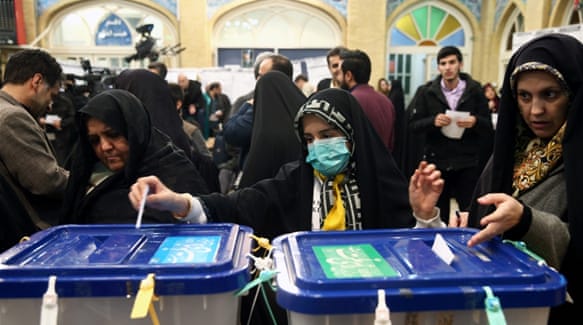Polls have closed in Iran's second round of parliamentary elections held in 10 constituencies, with the authorities mobilising about 100,000 people to ensure a smooth process.
Friday's race for the remaining 10 parliamentary seats was being held in 3,100 voting stations after months of delay due to the coronavirus pandemic.
The first round in February saw the lowest voter turnout in the 40-year history of the Islamic republic and resulted in its most conservative parliament.
"It doesn't look like the politics dynamic in the parliament is going to change," Al Jazeera's Assed Baig, reporting from Tehran, said on Friday.
"Two-thirds of those seats still belong to the conservatives - and that's not good news for Rouhani's [reformist-aligned] government" ahead of next year's presidential election, he added.
In July, conservative members of parliament heckled Foreign Minister Mohammad Javad Zarif and denounced him as a liar during a speech to the 290-member body, or majlis.
Online campaigning
The issues dominating Iranian politics include the state of the economy, corruption and crippling sanctions reimposed by the United States in the wake of its 2018 unilateral withdrawal from a landmark nuclear deal signed between Iran and world powers in 2015.
In Golestan province in northeast Iran, residents said they wanted to see action from their elected representatives.
"I hope my lawmaker cooperates with the people," said one voter.
Politicians are encouraging more people to come out and vote but the pandemic complicates the situation, while candidates were barred from campaigning on the streets.
"As the health ministry has warned against any public gathering, we asked the candidates to take their campaigns online," Jamal Orf, the president of Iran's election commission, said.
During the opening session of the new parliament in May, Rouhani, who is in the final year of his second and final term, had called on MPs to place the "national interest above special interests", "party interests" or "constituency interests".
The body, which was previously dominated by Rouhani's reformist-moderate camp, is now composed of a majority of 220 conservative politicians, including more than 50 who are close allies of former hardline President Mahmoud Ahmadinejad.
There are also 38 independent legislators and 18 pro-reform and moderates, down from 136 in the previous House.
The number of female MPs stands at 16, compared with 17 before.
Latest Stories
-
Inter edge out Bayern to reach Champions League semis
3 hours -
Superb Arsenal defeat Real Madrid to reach semi-finals
3 hours -
GPL 2024/25: Young Apostles’ late goals seal win over Berekum Chelsea
3 hours -
FIFA Club World Cup arrives in Casablanca for final African stop
3 hours -
Level 100 student allegedly commits suicide after partner cheats on him
5 hours -
Tariffs will hit US economy and raise prices, says Fed boss
6 hours -
Muster courage and go by dictates of report – Dr Asah-Asante to NPP
8 hours -
Minority urges Mahama to act on Bawku security situation
8 hours -
Olive Tower Prayer Ministries, Unilever Ghana hold free health screening for 700 Pokuase M.A. Basic School students
8 hours -
Obama calls Trump’s freeze of Harvard funding ‘unlawful’
8 hours -
Albert Kobina Mensah: Observed or discovered?
8 hours -
US tariffs will make global trade shrink, says WTO
8 hours -
UK bans EU cheese and meat imports to prevent disease spreading
8 hours -
NPP to begin nationwide Thank You Tour after 2024 election defeat
8 hours -
GPL 24/25: Aduana Stars defeat spiritless Hearts of Oak
8 hours

